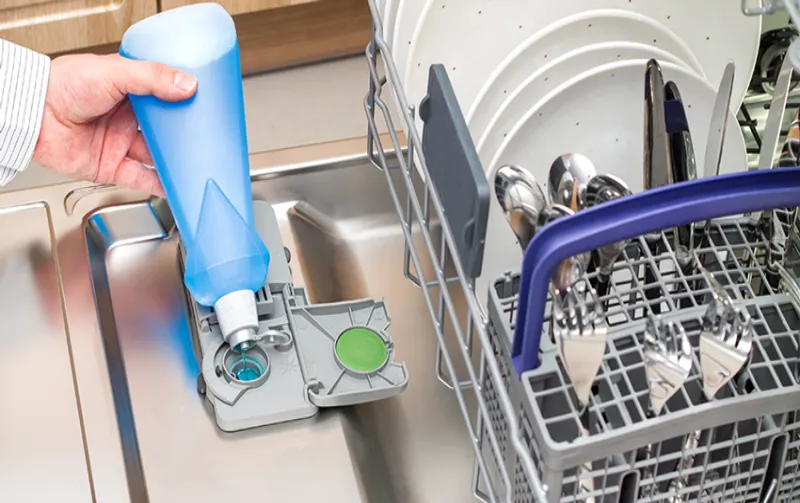Do I Need a Rinse Aid for My Dishwasher: Essential Guide for Spotless Results
We may earn affiliate fees for purchases using our links (at no additional cost to you).
Yes, using a rinse aid in your dishwasher can help improve drying and prevent water spots on dishes. Rinse aid is beneficial for improving the performance of your dishwasher and ensuring your dishes come out clean and dry, free from water spots.
It helps to reduce the surface tension of water, allowing it to flow off dishes more easily and preventing water droplets from forming.
In addition, rinse aid can also help to prevent the build-up of mineral deposits on your dishes, silverware, and glassware, leaving them looking cleaner and more sparkling.
It is particularly useful in hardwater areas where mineral deposits are more likely to occur.

Spotless Results And Shiny Dishes
One of the most satisfying feelings after running the dishwasher is opening it to find spotless, sparkling dishes.
Achieving this level of cleanliness and shine often leaves many wondering if using a rinse aid is necessary.
Let’s explore why rinse aid is crucial for both eliminating water spots and improving drying performance.
Eliminating Water Spots
Rinse aid plays a critical role in ensuring that your dishes emerge from the dishwasher without unsightly water spots.
When water droplets dry on dishes, they can leave behind mineral deposits and residue, resulting in visibly unattractive spots.
Rinse aid helps to prevent this by breaking down water and helping it to sheet off the dishes, leaving them spot-free and crystal clear.
Improving Drying Performance
Another benefit of using a rinse aid is that it significantly enhances the drying performance of your dishwasher.
Without it, dishes can often come out damp and require additional hand-drying, which can be both time-consuming and frustrating.
Rinse aid allows water to easily drain off the dishes during the drying cycle, promoting quick and efficient drying to achieve that desirable gleaming finish.
Proper Rinse Aid Dispenser Settings
When it comes to achieving spotless, sparkling dishes from your dishwasher, the dispenser settings for rinse aid play a crucial role.
Properly adjusting the dispenser dial and ensuring the optimal rinse aid dosage is essential for effective dishwashing performance.
Adjusting The Dispenser Dial
Ensuring that the rinse aid dispenser dial is set to the correct level is vital for achieving optimal results.
The dial typically features settings from 1 to 6, allowing you to adjust the amount of rinse aid dispensed during the wash cycle.
It’s recommended to start with a mid-range setting and observe the results.
If there are water spots or residue on the dishes, gradually increase the dial setting until the desired cleanliness is achieved.
Optimal Rinse Aid Dosage
Understanding the optimal rinse aid dosage for your specific dishwasher and water hardness level is essential.
Refer to the manufacturer’s guidelines to determine the ideal amount of rinse aid for your machine.
Generally, for hard water, a higher rinse aid dosage may be necessary to prevent spots and enhance drying performance.
Conversely, for soft water, a lower dosage may be sufficient to achieve the desired results.
Factors To Consider
When considering whether you need a rinse aid for your dishwasher, there are a few important factors to take into account.
Below are some key considerations to help you make an informed decision.
Compatibility With Dishwasher Brands
Not all rinse aids are suitable for every dishwasher brand.
It’s essential to check the compatibility of the rinse aid with your specific dishwasher model.
Some brands may recommend specific types of rinse aids or have guidelines on which ones to avoid.
Consulting your dishwasher’s manual or reaching out to the manufacturer can provide valuable insights into which rinse aid is best suited for your machine.
Environmental Considerations
Concerns about the impact of cleaning products on the environment continue to grow.
When selecting a rinse aid, consider its environmental impact. Look for eco-friendly options that are biodegradable and free from harsh chemicals.
Opting for environmentally conscious rinse aids can help minimize your household’s ecological footprint while effectively enhancing the performance of your dishwasher.
Common Concerns
Do I Need Rinse Aid For Every Load?
It’s a common misconception that rinse aid is only necessary for certain loads in the dishwasher.
However, using a rinse aid with every load can actually enhance the performance of your dishwasher and deliver consistently spotless dishes.
Rinse aid helps to prevent water droplets from forming on dishes, glassware, and utensils, ultimately resulting in a quicker and more efficient drying process.
Can I Use Alternative Products?
Some individuals wonder if there are alternative products that can replace rinse aid in the dishwasher.
While there are homemade or DIY options available, such as using white vinegar, it’s important to note that these alternatives may not be as effective as a dedicated rinse aid.
Commercial rinse aids are specifically formulated to work with the detergent and the rinse cycle of the dishwasher, providing optimal results.
Using alternative products may compromise the cleanliness and appearance of your dishes.
Frequently Asked Questions For Do I Need A Rinse Aid For My Dishwasher
Is Rinse Aid Necessary For A Dishwasher?
How Does Rinse Aid Work In A Dishwasher?
What Are The Benefits Of Using Rinse Aid?
Can I Skip Using A Rinse Aid In My Dishwasher?
Conclusion
Using a rinse aid in your dishwasher can significantly improve drying performance and reduce water spots on dishes.
The benefits of using a rinse aid are clear, and it is a cost-effective way to enhance your dishwashing experience.
Consider adding a rinse aid to your dishwasher routine for shiny, spot-free dishes every time.